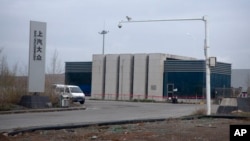Uyghur principal sentenced to 12 years for alleged separatist support
Erkin Tewekkul, a Uyghur principal in Urumqi, Xinjiang, received a 12-year prison sentence for allegedly supporting “nationalist separatists.” He was accused of disloyalty to the Chinese Communist Party and comforting students with detained parents. Radio Free Asia said his arrest was part of a broader crackdown on Uyghur intellectuals.
Volkswagen urged to address Uyghur forced labor
Human Rights Watch and the European Center for Constitutional and Human Rights are pressing Volkswagen to detail plans to eliminate alleged Uyghur forced labor from its supply chains at the company's annual meeting this year. Accusations have surfaced about forced labor in Xinjiang, where Volkswagen has a plant. Audits are deemed insufficient, and Volkswagen faces criticism for inadequate oversight of its Chinese joint ventures. The rights groups urged shareholders to ensure the company applies “robust measures” to tackle the issue.
East Turkistan group urges US Senate to pass Uyghur Policy Act
The East Turkistan Government in Exile (ETGE), a Washington-based rights group, has called on the U.S. Senate to pass the Uyghur Policy Act (S. 1252) to establish a special coordinator for Uyghur issues. ETGE advocates for recognizing East Turkistan, the historical name for Xinjiang, as an occupied territory and urges measures similar to the Resolve Tibet Act. The group stresses the need to counter Chinese disinformation and to support East Turkistan's self-determination.
Xinjiang launches three-year plan to boost tourism
The Xinjiang Uyghur Autonomous Region has unveiled a three-year tourism enhancement plan beginning this year to attract more visitors to the region. Following a record 265 million tourists visiting in 2023, the region is aiming to attract 300 million visitors in 2024. The growth in tourism comes as U.S. lawmakers call for travel restrictions to the region because of reported human rights abuses against Uyghurs and other minorities.
China raises concerns about Taiwan airlines' access to Xinjiang airspace
Chinese authorities have expressed intentions to review permissions for Taiwan's airlines to fly over the Xinjiang Uyghur Autonomous Region, a move that could affect Europe-bound flights by potentially increasing travel time and costs. Taiwan’s Eva Air and China Airlines have reported reaching agreements with Chinese authorities to uphold their existing routes. A third airline, Starlux, which does not operate flights to Europe, says it is investigating the situation.
China deploys stealth fighters near India border in Xinjiang
China has deployed J-20 stealth fighters to airbases in southern Xinjiang and Tibet, near the India border. The presence of four J-20s in southern Xinjiang, backed by Y-20 transport planes and KJ-500 surveillance aircraft, signifies an escalation of Chinese air force operations in the region. This development, occurring near Ladakh in India, aligns with ongoing border tensions between the two countries.
Chinese tomato paste arrives in Italy, sparking protests
Forty containers of Chinese tomato paste from Xinjiang arrived in Salerno, Italy, after a 10,000-kilometer journey. The Coldiretti farmers’ association protested, citing concerns about unfair imports and worker exploitation. They highlighted that 90% of China's tomato paste comes from Xinjiang, where reports of Uyghur forced labor are widespread. Last year, Italy imported 85 million kilograms of Chinese processed tomatoes, according to Coldiretti. Human rights groups have urged the Italian government to address these concerns.
News in brief
Chen Wenqing, China’s security chief, visited Xinjiang May 22-26, calling for the normalization of counterterrorism measures. Despite no violent attacks in over seven years, experts suggest this move signals continued suppression of the Uyghurs. Human rights groups warn that this could lead to increased surveillance and detentions. Beijing remains focused on maintaining stability in the region amid international criticism of its policies.
Quote
“They continue to prioritize so-called terrorism when there is no terrorism, and there never really were actual terrorists at all in Xinjiang. And so that’s the unfortunate issue when they say that they’re normalizing counterterrorism,” Anders Corr, principal of political risk analysis firm Corr Analytics in New York, told Radio Free Asia.
